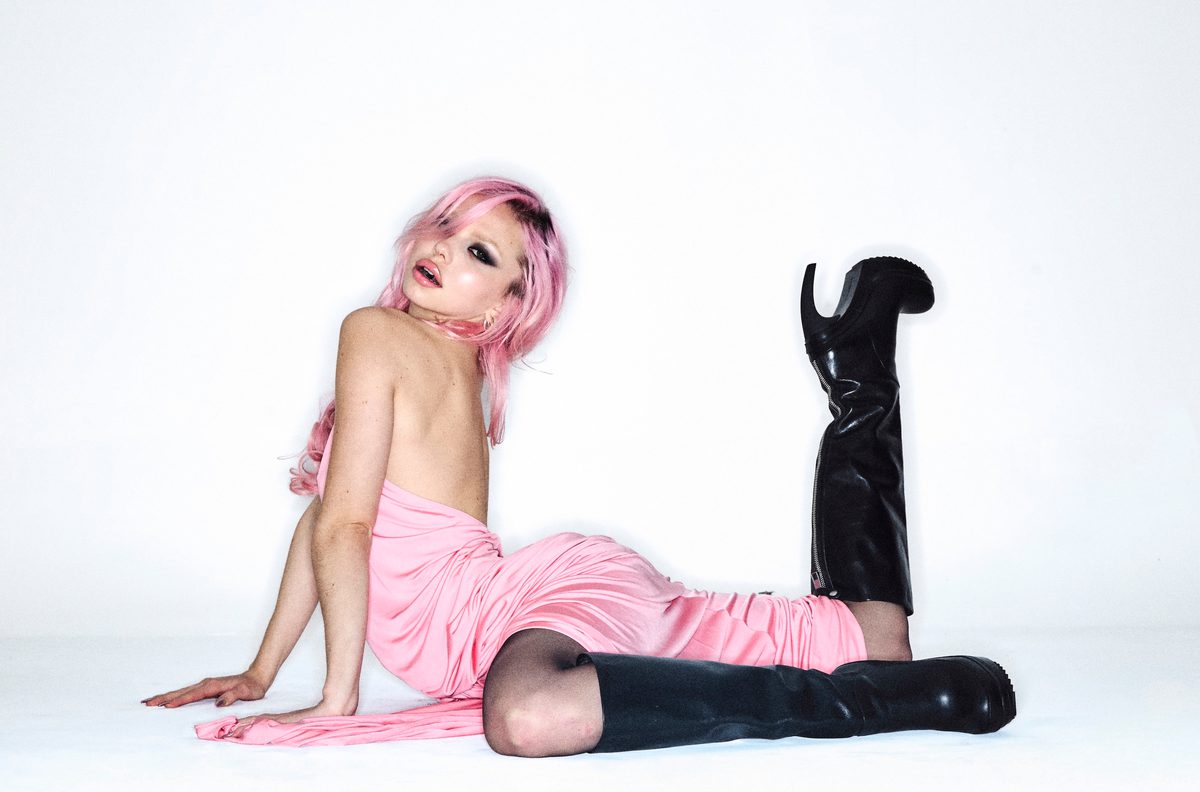
ADÉLA is writing destiny on her own terms
Styling by Chris Horan | Makeup by Natalie Ventola
A Gen-Z star forged in Slovakia, ADÉLA tells Sam Franzini about her blueprint for a new pop revolution.
Adéla Jergová was born to be a pop star. Raised in a conservative environment, her infatuation with American pop culture started when she first watched Hannah Montana at five years old, she tells me from her home in Los Angeles, a nude photograph of Madonna and Petra Collins’ photography books hanging behind her.
"Everyone you look up to," her brother realised one day, "The Beyoncés, the Britneys, the Hannah Montanas… they’re all American," – but Jergová didn’t really consider this to be a roadblock. To her, "American" was an adjective that could be attained with a lot of hard work — ever since she knew this was an option for a life, she decided, "this is what I need to do."
Now with just three singles released as ADÉLA and an EP coming later this year, it feels as if the 21-year-old has fast-tracked her way to celebrity, used a cheat code to get ahead. But that would discredit the years of work Jergová has put in, starting aged eight when she taught herself English (sans accent) by rewatching American television shows, knowing it’d be the first step to attaining stardom. "I developed this very Americanised view of the world, randomly in the middle of Slovakia, where nobody else thought the same way," she explains. "It was just quite a strange way to grow up."
Her parents are supportive now, but Jergová kept her American ambitions from them at first. She wrote a list – a sort of a proto-manifestation – to get the things she wanted: by the time she was 15, she dreamed she’d be fluent in English, and her Hawaii-based godfather would take her to Los Angeles for pilot season, where she’d travel to the Disney Headquarters, get signed, meet Miley Cyrus… "I knew how insane it sounded," she admits. Keeping it under wraps meant more than hiding an embarrassing secret — it was to keep her goals in line. "Where I come from, this has never been done before in a way that I want to do it and on that level," she says. Have you heard of a globally famous Slovak?
"I didn't want to say it out loud, because I knew it was possible for me. I didn't want [my parents] lack of belief to affect my belief in myself, and so they just were not aware. And then one day I was speaking English fluently when I was nine. They were, like, 'Okay, I guess you have a special interest.'"
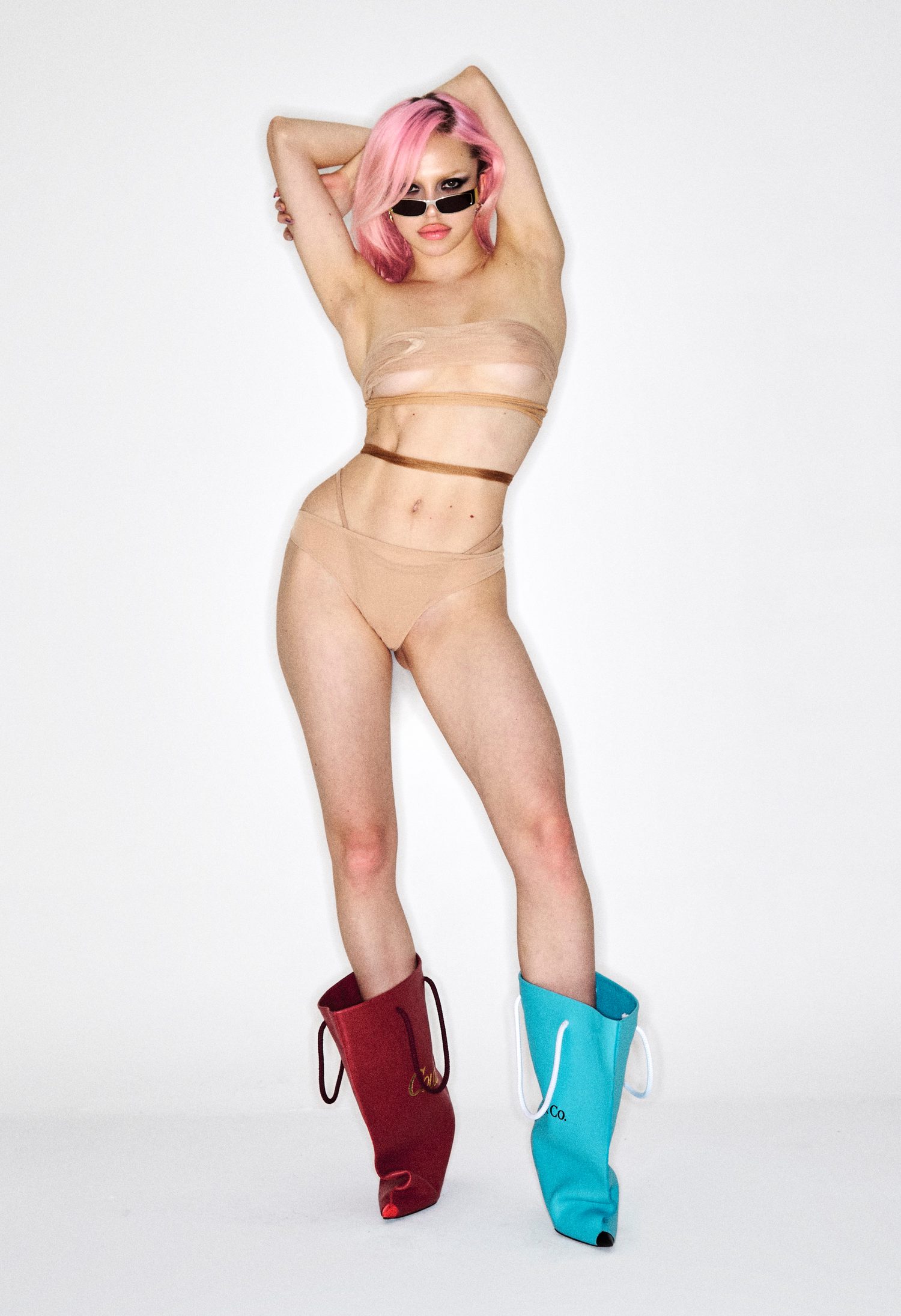
Jergová was quite the determined pre-teen. Raised on the homogenised Internet, she had a "deep, guttural knowing" that she could attain fame — she saw bloggers like Bethany Mota go from a regular girl to a superstar influencer, along with countless others liker her gaining a following by sharing their talent. Performing "was the only thing that I ever wanted to do," she tells me, and the rigorous demands of becoming a professional ballerina — eight hours of practice, followed by more after hours — gave her a hardened sense of discipline, as well as a competitive, sly mindset. "I got off on the fact that I was working when everybody else was sleeping," she says.
"I was so narrow-mindedly, like, how do I get from Point A to Point fucking Z?" she asked herself. It’s not easy to go from a child in a small, foreign country to one of the most exciting Gen-Z pop stars of the moment — or even have the guts to think about such a feat in the first place. "In a childlike, stupid way," Jergová says with a smile, "and it really worked for me."
Her approach — working very very hard — has resulted in some spectacular results. Her latest single, February’s "MACHINE GIRL", is a succinct and sharp send-up to entertainment television where reality is distorted, people are treated like pawns, and extremity triumphs over nuance. "Why you comin’ at me, baby? Yell at the machine, girl!" she taunts. The video, choreographed by Jergová and Miguel Zárate, is angular and violent; a line of six women battle each other while playing to the camera, swinging at heads and threatening ankles. Grimes, who co-produced the track after DMing Jergová out of the blue, cameos at the end to advise the catfighters to turn up the rage.
It’s a not-so-subtle jab at her time in Pop Star Academy, the Netflix competition show where contestants audition to join the meticulously-created global girl group that would become KATSEYE. Jergová was one of the first to be eliminated and is not shy about the fact that it hit her hard: "It was the worst year of my life," she says, calling it "identity-stripping."
Most girls went home after being kicked off, to reprogram or destress, but it wasn’t an option for her: "I just knew that if I went home in that moment and I wallowed in that rejection and sadness that comes with such a life altering thing, I would not be back."
A trip back to Slovakia would mean starting over, back to a childlike blankness, which didn’t fit with the curated life plan she set out for herself. "Do you think I'm gonna go to college after I spent two years doing this every single day?" she asks. "For years, doing singing and dance lessons? I didn't have a childhood, and you want me to go to college? What are you talking about?"
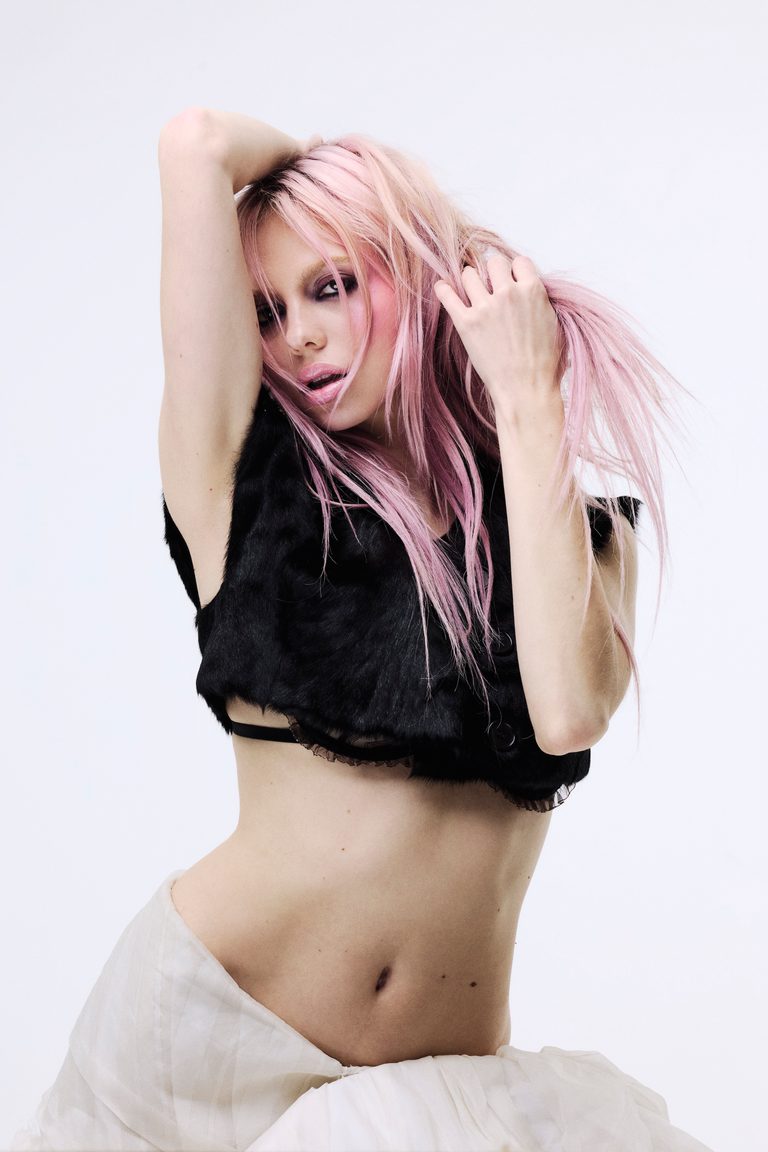
Jergová knew she had to stay in LA and undergo the artist’s rite of passage — to find "a really shitty apartment and move out here and figure it out." After a quick trip home to renew her visa, it was a year of exploration and trial and error — before she arrived at her now-cemented electronic, explosive pop, she went through an indie rock phase she knew didn’t suit her ("The only music that I've ever listened to is pop music. Like, what am I doing?" she says). On her vision board are the typical influences of Britney, Madonna, Lady Gaga, as well as more esoteric picks like Imogen Heap and M.I.A. Her songs are brash, cutting, unafraid to show Jergová's vision for ADÉLA first and foremost.
"I wrote down this Google Doc of ADÉLA, the entertainer, and my mission statement: the colours and pictures and the feeling, the textures, the ethos of it, the sounds, the influences, and it helped me regain [my identity]. I came back from that trip home, and I wrote 'HOMEWRECKED', and it all made sense. I was like, 'Okay, this is what I'm supposed to do.'"
When the show premiered in 2024, Jergová was disheartened to see the lack of media literacy that came from the audience, their excitement at seeing two girls fight without having the full story and not even knowing that they lack crucial context. "A lot of people sent a lot of terrible energy my way, and a lot of the other girls' way," she says. "No matter what you do in that situation, [the audience is] just gonna keep on spinning their own narrative about it." Instead of directing anger at the potentially manipulative showrunners, internet commenters spewed ire at the performers themselves, already in an incredibly competitive environment, and who were between 14 and 21 years old.
"My whole ethos as a human is that I'm extremely imperfect, and so is everybody else, and I find that so beautiful!"
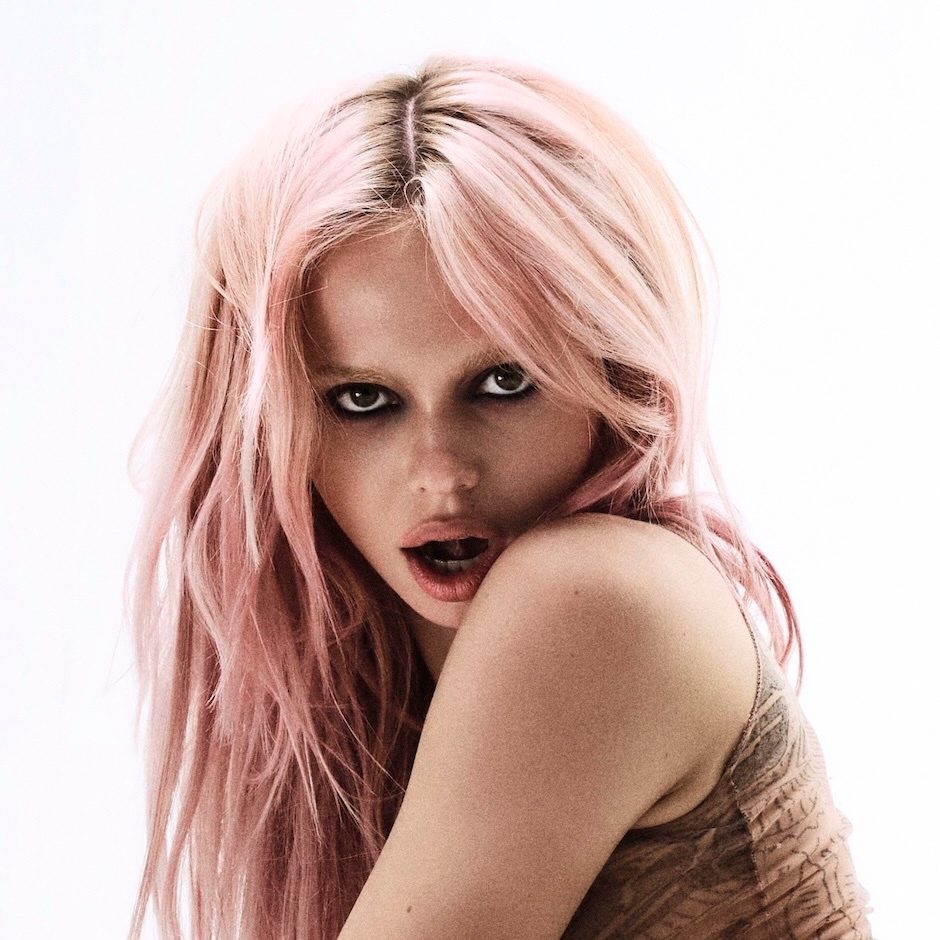
I bring up other forms of reality television I consume regularly, the RuPaul’s Drag Races and Survivors where the audience sees a highly edited, packaged, and produce sequence of events, and still feel they know each contestant inside and outside of the show and have the audacity to judge how good of a person they are. There’s death threats, there’s hatred, all over entertainment. It can take a lot to differentiate between reality and a hyper modified product, and some self-proclaimed enjoyers of this media lack the empathy and simply can’t do it yet. Though it doesn’t matter to Jergová — she knows what truly happened, and remains close with the girls (not that this matters to outside viewers).
There were squabbles on set, for sure — there were twenty girls from all over the globe, living in close quarters and competing with each other to gain immediate superstardom — but if Jergová took anything from the show, it was a reminder of how much she loves women. "I think women are the best, seriously," she tells me. "There was so much care, and so much thought from everybody. Truly, [there was] no like sabotaging or anything, and it was just so heartwarming. How much true love and support there was was just so beautiful."
I probably wouldn’t have been able to handle thousands of comments on my friendships, my body, or my performance abilities at that age, and I tell her what developed viewpoint I think this is. "We were such a tight knit unit, and everybody was so emotionally mature," she replies. "I think some people might let it get to them, but it just never even occurred to me. It’s like, I know these people in real life, you know? So it's different. You need to stay grounded and human."
That her experience in Pop Star Academy made its way into a song — and one as unfiltered and honest as "MACHINE GIRL" — isn’t really surprising. This generation has been raised on checking the power of label giants that work unfairly, and recent inside accounts from entertainers like RAYE or Chappell Roan have brought malpractices to the forefront, hopeful to enact real change. "Hollow body for projection / Past her lips, you will find her brain / Pinned-up poster of pop perfection / Misinterpreted shot to fame," Jergová sings on the zippy, frenetic song. Talking about the machine while enjoying the benefits of it is a bit of honesty most might not dare to indulge in for their third ever single.
Her sharp image commentary reminds me of another point in our conversation, when she brings up the performance of sex and how the pressure to do so has changed through the decades. "I love sex and I love being sexual," she caveats, saying that when she was on the show, the producers told her to tone down the way she naturally expresses herself. "It’s interesting to think back to when pop stars didn’t have as much freedom, where their sexualisation stemmed from. I consumed that art, and my sexualisation of myself, the way I express my sexuality — consciously or subconsciously — is influenced by their art. It all stems from the male gaze. It’s this dichotomy — I wonder if that wasn’t a thing at all, if we weren’t doing it in this way. Now it’s empowering."
It’s an interesting idea. Jergová finds freedom in her natural sensuality, but what if it was awakened by exploited women? Is the knowledge and unpacking of that restricted, predatory period enough to continue, or is it just perpetuating a cycle? "Thanks to women like Britney, Madonna, Janet, all of these people that opened the door for us, the industry is now a much freer and safer space for artists," Jergová says. "I do wonder if I’d be sexual in a different way, if it was all free from the start. Maybe the female sexual experience would be different, and sex as a marketing tool would look different." Without the knowledge of that alternate world, setting your own terms will have to do.
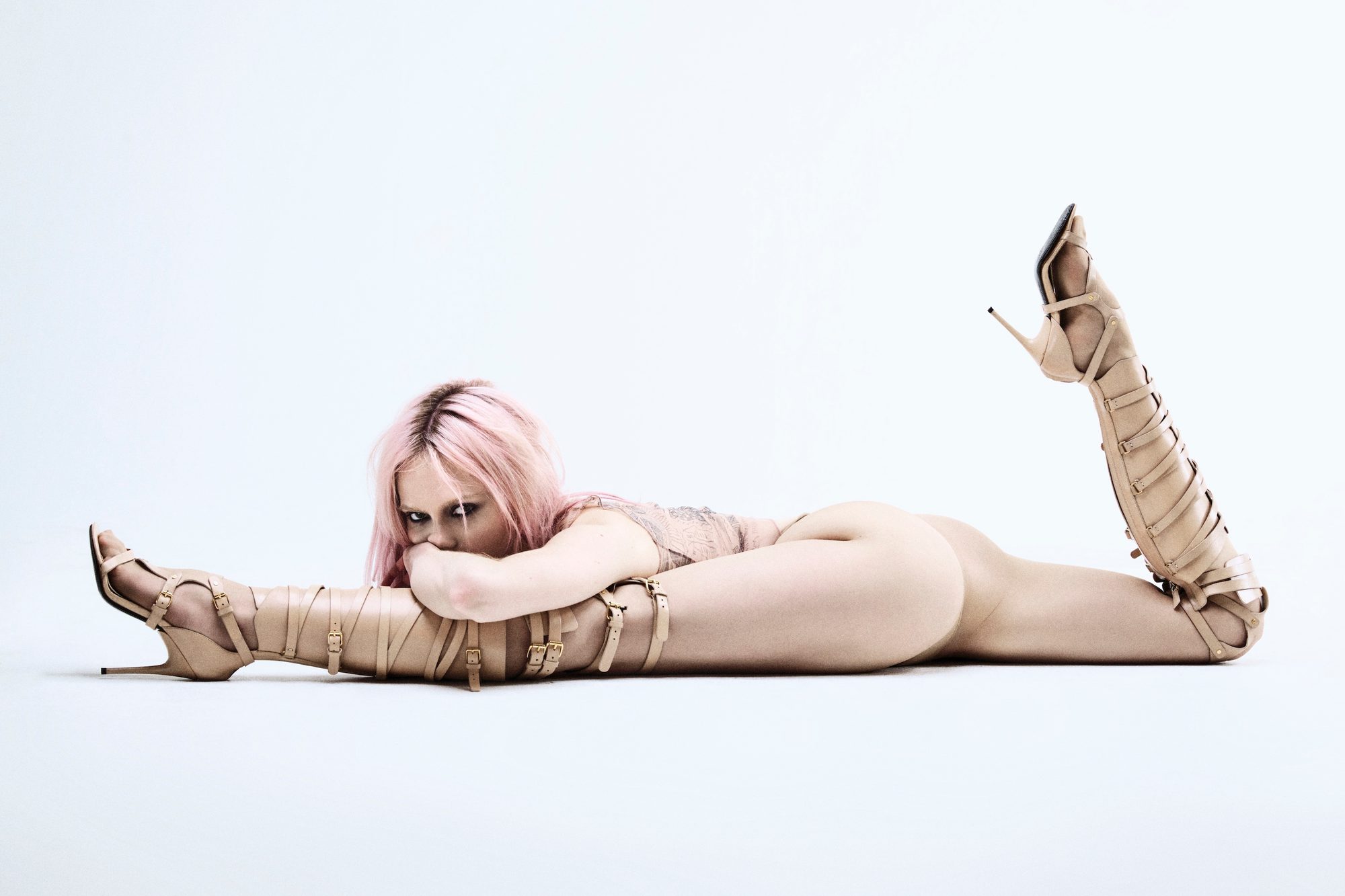
In a similar vein, we talk about the cover of Sabrina Carpenter’s new album, where she’s on all fours, an off-camera male pulling at her hair. Titled Man’s Best Friend, it’s provocative, striking — and deeply smart. Carpenter has always been known for her wit, but internet commenters are more likely to misinterpret her winking satire for an unabashed catering to the male gaze, performing for a bros or an unseen label CEO instead of seeing it for what it is — a deeply silly taunt. But the criticism has come from an unlikely place.
As Jergová puts it, "What the fuck are you guys talking about? This is what you’re getting mad at? I think the pendulum swung and now it’s this conservative [era]... Although it’s the liberals. It swung so far around that we’re conservative with women. We don’t let them be sexual for their own enjoyment anymore."
What happened to the openness this generation supposedly had about sex? To laugh and not take it so seriously? "I think a lot of people on the internet are very far from having their frontal cortex developed," Jergová says (and includes herself in this category). It’s something she touches on in the EP, the use of her body as a tool, as a road, and simply as part of her. I’m happy how honest she gets in our conversation — a more timid person might not have been swinging around ideas how liberals and conservatives behave, like a wordy uncle at Thanksgiving (maybe Americanising herself had some side effects).
"My whole ethos as a human is that I'm extremely imperfect, and so is everybody else, and I find that so beautiful," she says. "I find both sides of me interesting. Obviously, my first song was about me wanting to kill my dad's mistress. I mean, probably not the right emotion to have. But it's real! You would be mad too!" She’s talking about “HOMEWRECKED”, her revenge hit-and-run fantasy that unfurls with a "rotten, ugly rage inside of me." After she makes her mark, she flees to America. "I'm not very interested in keeping it very PC or down the middle of the line, nice girl, because I don't think I'm that at all. If you've seen the show, and if you've watched any of my content or consumed any of my music, I think one can tell I'm just interested in expressing myself to the fullest."
Not having full control of her vision would be incompatible with how Jergová operates. Maybe getting eliminated from Pop Star Academy was a blessing in disguise — now she has the full opportunity to progress independently. "If there’s six people in a group, you can’t let everyone have creative freedom, it’s never gonna work. That’s what K-pop is. But now being a solo artist at an American label, I get to completely be myself." Do you think she’d come all this way just to acquiesce to someone else’s ideas? In fact, when she auditioned, being in a group was never really a part of her plan. The executives on the show agreed, saying she’d work more as a solo artist, which she learned retroactively. "That would have been nice to hear," she says.
Her music videos are filled with comments from fans relieved she went solo, but she’s been receiving somewhat misguided pushback, too. I bring up her post I saw a while ago, with a pouty Jergová sitting atop a Capitol Records contract. "I sold out fr," she says in the caption. In our conversation, she has no qualms about reaping the benefits of a team behind you – "Being a pop artist is hard. You need budget, time, effort, people to be passionate about it" – but some may see a label backing not as a career boost but as autonomy regression.
"When I was doing everything independently, people were so vocal about not wanting me to sign," she explains. "I get to retain my creative freedom, even though I’m signed, but I think the general public’s perception of it is, 'You’re gonna be imprisoned.'" The post was a cheeky way of playing into her own audience’s perception; she admits something like "MACHINE GIRL" too was trolling a deliberately obtuse subset of listeners. "I’m still completely in charge and I get to work with people who respect my vision, since that’s where it started."
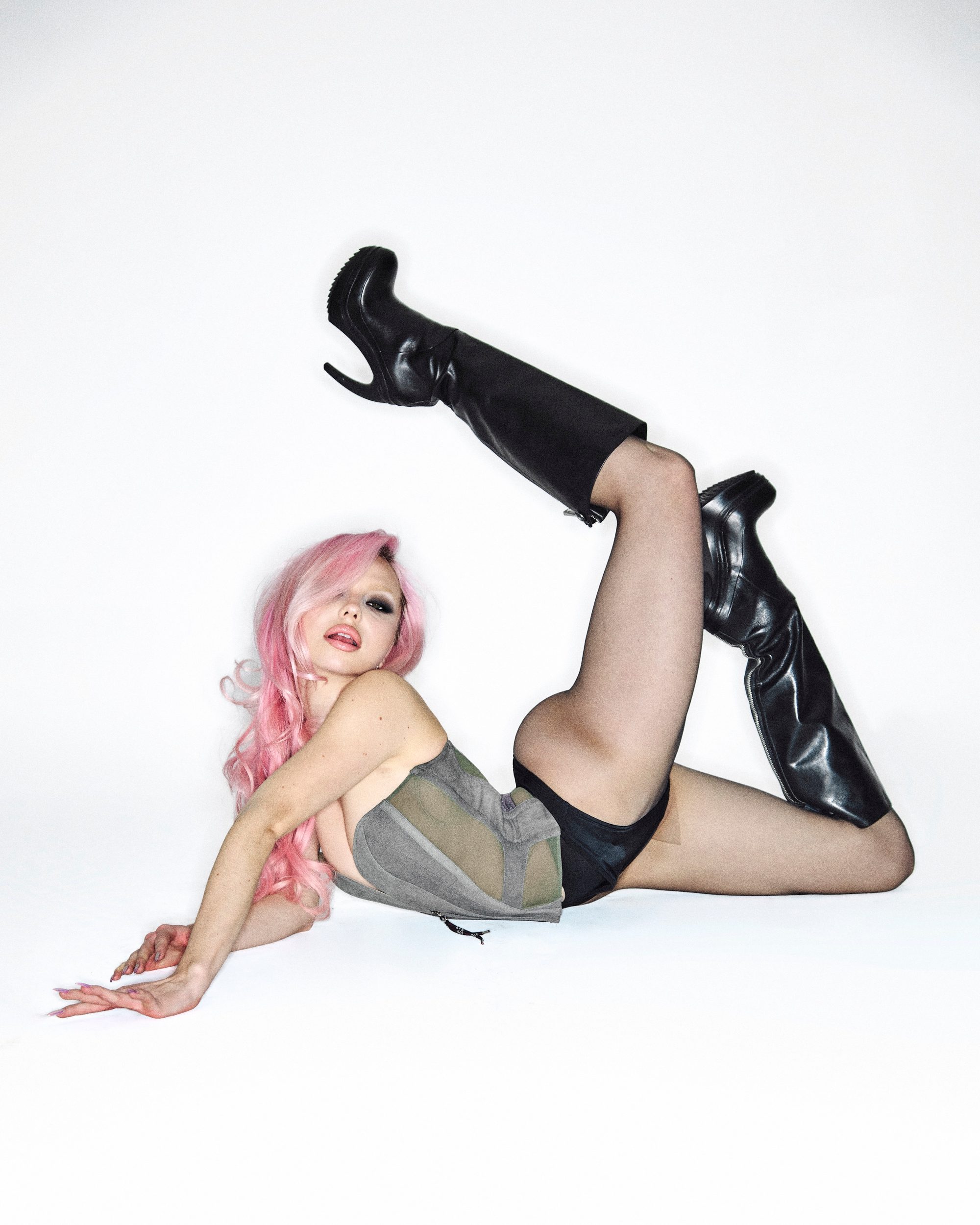
Jergová’s plan is assertive and bold, uncompromising and commanding (when people hear it, she hopes that they’ll have a thought – whether it’s admiration or irritation). Two songs that complete her upcoming EP are gritty, sublime, perfect for the club’s flashing lights, like if Tate McRae fused with Charli xcx with the help of Grimes. There was a lot of "speed dating," Jergová says, to make the perfect team, which is now made up of Alex Chapman, Leland, Dylan Brady, Blake Slatkin, among others. It’s a conceptual project that centers an exaggerated version of ADÉLA — sort of a character anyway — growing up, moving to Los Angeles, making it as a pop star. There’s some truth to the mistress-killing — or at least, she certainly felt the visceral rage at the time. "I saw this Greta Thunberg quote the other day, where she says, 'I think we need more angry women.' I agree. I am quite the young angry woman."
Even with the EP finalised, it wouldn’t make sense for Jergová to take a rest now. She wants to do shows, more music videos, and soon, she plans to work on her debut album, her time to create a cohesive work, which will be a "sacred experience," as she puts it. For now, she plans to hit the ground running; even though everything’s moving pretty quickly, she hopes the momentum remains the same, despite the work involved. "I want to be in the clubs," she says when I ask about her future plans. "I want to be the people’s pop star and be in the clubs with them and get down. I want to be 2006 Lady Gaga in the parking lot doing 'Just Dance'. That’s my vibe I want to be on."
Get the Best Fit take on the week in music direct to your inbox every Friday

Lorde
Virgin

OSKA
Refined Believer

Tropical F*ck Storm
Fairyland Codex





